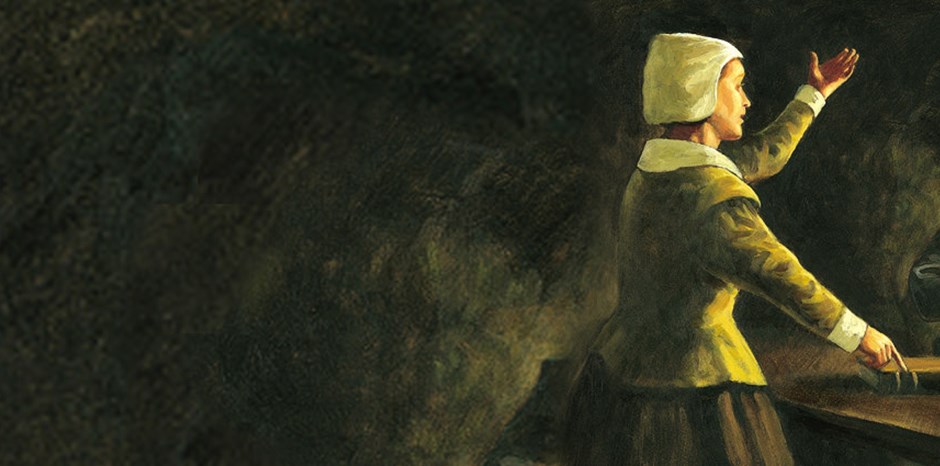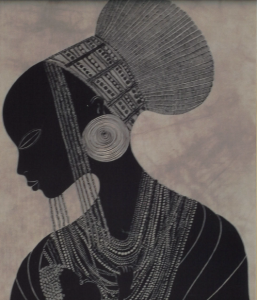For centuries women have fought against numerous injustices forced upon them because of their gender. Some of these injustices include the right to be seen as an equal to men, the right to vote, and the right for equal pay, along with many more. Although women have succeeded in breaking down some of these barriers, there are still many inequalities being fought today. During the seventeenth century, there was one woman in particular who battled in opposition to social injustice: Anne Hutchinson. This article is about the life of a brave woman who opposed an unfair law forbidding men and women from freely practicing their religion, and who also challenged the preposterous roles women were limited to in the religious community.

Anne Hutchinson, maiden name Anne Marbury, was born July 20, 1591, in Alford, England. She was the daughter of a midwife and a Cambridge scholar who published many unorthodox religious texts. In fact, Francis Marbury’s teachings were banned from where he was a teacher, at Saint Wilfred’s School in Alford. After vigorous pleading, Marbury was able to have the ban lifted, and he began teaching again in 1602. 1 Perhaps this is where Anne inherited her tenacious spirit to express her opinion. In 1605, at the young age of fourteen, Anne and her family moved to London for her father’s new position as rector of Saint Martin’s Vintry, leaving behind Anne’s boyfriend, a tailor named William Hutchinson. After the death of Anne’s father in 1611, Hutchinson moved to London to be with Anne; the next year the two were married. That same year, the newlywed bride returned to Alford where her husband continued his tailor business, and Anne followed in her mother’s footsteps as a midwife. Anne and William went on to raise thirteen children together in Alford. 2
In 1612, newly ordained Puritan minister John Cotton began preaching at Saint Botolph’s Church in Boston, Lincolnshire, not far from Alford where Anne Hutchinson resided. His unique approach greatly intrigued Hutchinson. 3 Cotton’s preaching and his understandings of religion reminded Anne of her father’s teachings. Anne enjoyed Cotton’s work so much, that in 1633, when Cotton immigrated to New England, Anne convinced her husband to move there as well. In 1634, Anne and her family made the long transition to Massachusetts. 4
The following year, in 1635, Hutchinson began holding weekly gatherings in her home to discuss minister Cotton’s sermons. Anne and her followers addressed their beliefs of sheer grace as opposed to the Calvinist theological viewpoint of predestination. Hutchinson and her followers believed that God alone grants salvation to whomever He believes is worthy of His grace, without human interaction. The clergy in New England taught that people could gain God’s grace by willingly performing various covenant conditions, such as performing good deeds, reciting prayers, attending church, along with other forms of religious practice. 5 Anne’s critics called her teachings Antinomianism. The Greek word is translated as “hostile to the law.” Anne provoked the colony leaders by proclaiming that members of their clergy who had not undergone a conversion experience had no authority to be held responsible for the spiritual offices of the colony. She also brought attention to the common yet unfair assumptions of women’s roles within Puritan society. 6 Anne’s following continued to grow, and it became so significant that in the 1636 governor’s election, the colony prevented the reelection of the current governor John Winthrop, and elected Sir Henry Vane the Younger into office. Sir Henry was an outspoken supporter of Anne’s movement, and he was a strong supporter of the anti-Winthrop movement.

Anne’s rising popularity caused three major problems for the colonial leaders. First, Anne’s gatherings paralleled preaching, which was strictly limited to those with a licence, and was absolutely forbidden to women. Second, the New England clergy was putting forth great effort in order to establish a unified church. Anne’s teachings contradicted their efforts. Third, Anne’s supporters consisted of both men and women. This act challenged the status quo of men being the only influential figures within society. 7 Never before had a woman caused so much trouble for authority figures, nor had a woman been the leader of a huge support of individuals.
The turning point of Anne’s momentum occurred during the governor election in May 1637, when former governor John Winthrop was reelected to office. It is not difficult to understand why Winthrop put Hutchinson on trial for heresy when he took office in November. 8 Winthrop was desperate to regain social order within the colony. The trial was held publicly to make an example out of Hutchinson, to show what happens to those who oppose the church and therefore oppose the colonial leadership. Anne surprised many with her witty banter and intellectual remarks. She defended herself quite impressively, proving her knowledge of the Bible and religious laws, and also by providing evidence demonstrating that her accused charge was based on more circumstantial evidence than proven facts of illegal activity. For example, the court tried to charge her with sedition, or an action suggesting discontent or rebellious actions against the government. Hutchinson made it clear that expressing opinions and holding conversations within a women’s meeting was not an illegal act. The statements made within those meetings were confidential because they were held in the privacy of her home. The spectacle of a self-educated woman verbally battling a governor who was a Cambridge scholar on an equal level was unheard of. Despite Hutchinson’s efforts, she was still convicted and banished from the colony. Anne was at a disadvantage from the start with civil officers, elected deputies, and clergymen represented as the jury in the trial. 9 After the verdict, Anne, her family, and a few loyal followers migrated to Rhode Island for a short while before settling in the Dutch colony of New Netherlands, which subsequently became New York. In 1643, Anne and her family became victims of an Indian uprising and were killed during the attack.

Anne Hutchinson is seen as one of the first female feminist who fought for religious freedom. Anne’s actions represent a right established to us as Americans in 1791. The first amendment to the Constitution established the freedoms of religion, assembly, speech, press, and petition. Anne’s reasons for refusing to conform to colonial authorities were reasonable and respectable. She was not the only person to fight for individual freedoms; but her courageous start led the way for others to fight against injustices too.
- John R. Holmes, “Anne Hutchinson,” Salem Press Biographical Encyclopedia (January 2016), 1. ↵
- Holmes, “Anne Hutchinson,” 1. ↵
- Francis J. Bremer, “John Cotton,” Salem Press Biographical Encyclopedia (2016), 1. ↵
- Holmes, “Anne Hutchinson,” 1. ↵
- James F. Cooper, Jr., “Anne Hutchinson and the ‘Lay Rebellion’ against the Clergy,” The New England Quarterly, Inc 61, no. 3 (September 1988): 382-383. ↵
- Alan Brinkley, American History, 15th ed., vol. 1: to 1865 (2 Penn Plaza, New York, NY 10121: McGraw Hill Education, 2015), 45. ↵
- Holmes, “Anne Hutchinson,” 1. ↵
- Alan Brinkley, American History, 45. ↵
- Lisa McGunigal, “The Criminal Trial of Anne Hutchinson: Ritual, Religion, and Law,” Mosaic: A Journal for the Interdisciplinary Study of Literature 49, no. 2 (June 2016): 1-8. ↵



133 comments
Saira Castellanos
I do understand that women were treated incredibly unequal, and we have been able to beat some of the insane laws men made in order for women no to do certain things. I am truly inspired by Anne and her courage, but there are many feminists today that need to step back. I do understand women do have all the rights of a man, but men are superior to women, its the sad truth. Men are just genetically more powerful than men. Sure women can be smarter than men just like Anne showed she was, but sometimes men are just superior to women and nothing can change it.
Ashley Tumlinson
Very well written article! You did a great job at portraying the role she played during her time. It was truly fascinating to read about Anne – and other women’s constant fight against sexism and religious freedom from the government. As for how far back this fight goes – you would think it would be over by now. However, even though the fight is not completely won, it is great to read an article like this one that recognizes just how far we have come!
Matthew Rios
I’ve always come to appreciate first wave feminist for what they helped accomplish in our society. They’re truly beacons of justice for women, and even today. Third wave feminism doesn’t fight with the same principles in mind in my opinion as the first. Understanding that today’s challenges for women are different, the role of the feminist should remain constant. Fight for equality of opportunity, and treatment, but never guaranteed outcomes.
Amanda Figueroa
This is a very well written article that represents how women, especially Anne Hutchinson, have been fighting for equality and women’s rights. It’s truly inspiring to read how Anne caused three major problems for the colonial leaders, which shows her determination and challenging the status quo. Anne Hutchinson is a major factor in the search for religious freedom, which is very important in the colonial period.
Alondra Aviles
Anne Hutchinson was a female role model for those who were in danger of religious persecution and female stigma. She evolved her beliefs into something that made “headlines” and brought attention to female puritans. Proving herself more worthy than a mere housewife. The fact that she had 14 children and continued her religious protest is appalling. She became an idol for women in her puritan village that followed the same or similar beliefs. Overall the article showed a very strong women that is worthy of more attention. A true feminist that properly portrayed her deserved role as a woman in church.
Karla Chavana
Feminism means equality. Although feminism is a concept that I have known all my life I never knew of its origins. While reading this article about Anne Hutchinson, I was left in awe. This woman was so rightfully centered and so sure of herself. She knew that the world and society were being unjust towards females, and she could not and would not stay quiet. She is definitely an example of a true feminist. A woman, or a man who yearn for equality, whether it is religiously or socially.
Alejandra Chavez
I had always heard the Hutchinson name being influential in feminist movements but I had never known the real reasons why. I’ve also been compared to her and now I can understand that my teacher had related me to her because we both share the same tenacious spirit to voice our opinions and to challenge social concepts. I highly respect her, and I now aspire to be like her, because she was had her merits in check in accordance to the laws of the government, was knowledgeable of what she was doing, and even proved that the court was giving her a hard time simply because of her gender. I strive to live my life just as she did.
Edward Cerna
This was a very well written article. I had only known very little information about her from when I briefly went over her in High School. I like how Anne had included both men and woman in her gatherings and like you mentioned it challenged the status quo of men in the colony. I look at how things are today and see how far we have come and we can thank Anne Hutchinson for her efforts because I believe she had a part in our progress.
Anayeli Prieto
I want to congratulate you on your excellent article. I am really astonished at Anne’s courage to step up to fight for her religion rights. many times people in these situations, just kept quiet and continued to obey the rules that were made for them. I have never really heard of her before and I wish we learned more about great leaders like Anne. she definitely is an example to follow and someone to look up to.
Briana Bustamante
Superb job on your presentation! I found your presentation on Anne Hutchison informative and interesting. She was a very religious person who fought for women’s rights, spoke out against government corruption and empowered women everywhere. I found it interesting that Anne and her husband had thirteen children. I wonder how she had time to advocate for women’s rights with so many children to look after. She is an inspiration to all!